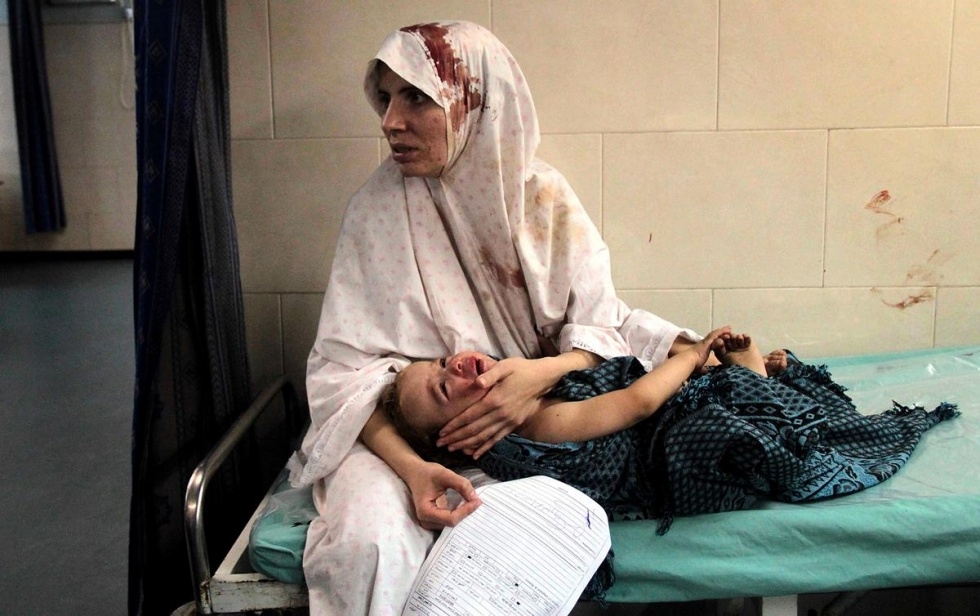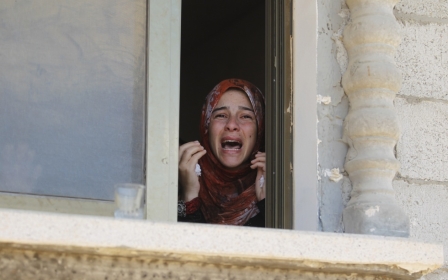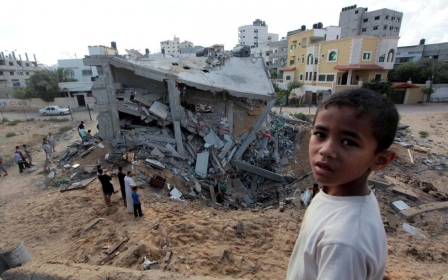'If they take it out, they’ll take us with it'

El-Wafa Medical Rehabilitation Hospital is quiet inside. Its staff evacuated most of the patients over a week ago, leaving behind only those too critical to stay with relatives. Entire floors are now empty, with the footsteps of a doctor or nurse down a hallway sometimes breaking their silence.
The 14 remaining patients are the most critical cases. Alone among the Gaza Strip’s hospitals, el-Wafa specialises in occupational and physical therapy. Its current residents have survived the kinds of traumas, like car and industrial accidents and near-drownings, which have killed others.
Many rely on feeding tubes and are periodically cleaned by attendants. Few can carry on a conversation.
Outside the hospital, the volume changes. El-Wafa lies in the Shujaya neighborhood, the eastern end of Omar al-Mukhtar Street, Gaza’s main commercial thoroughfare. The separation barrier with Israel is meters away. At its closest approach, a chain of warehouses blocks its view.
Behind this row, ominous noises sound: rumbles, and an occasional boom. The roar of an unseen warplane overhead sometimes punctuates the constant whine of drones. At times this clamor rises enough to penetrate the hospital’s quiet walls.
Some noises strike more sharply than others. When a missile whistles past, everyone, staff and patients alike, cringes until it crashes somewhere close nearby.
They have reason to worry. Early Friday morning, four Israeli warning rockets – non-explosive missiles sometimes fired at buildings, typically civilian homes, before a larger airstrike – slammed into the hospital’s roof and walls.
Then late in the afternoon, a missile struck its fourth floor, the building’s highest, leaving a gaping hole, shattering windows and unhinging doors.
A short time afterward, Basman Alashi says, the hospital received a telephone call from an Arabic-speaker with an Israeli accent. Without identifying himself, the man asked if anyone had been injured in the strike, and whether the hospital planned to evacuate.
I sit in Alashi’s office. The executive director of the Al-Wafa Charitable Society, which runs the hospital and a string of other charitable projects, he answers a flurry of telephone calls: from foreign journalists, the Ministry of Health, and other hospitals in the Gaza Strip.
Between them, we chat about the multiple crises facing the local health sector. Like other hospitals, Alashi says, el-Wafa has dangerous shortages of urgently-needed medications, and the list of shortages is growing rapidly.
And due to the rising casualties of Israel’s military offensive, al-Shifa Hospital, Gaza’s largest, evacuated two of its patients to el-Wafa yesterday. Another is due to arrive today, with more expected to follow.
“They’re just full,” Alashi says. “There’s nowhere left there for new patients to go.”
Staff at the hospital tell me of its other difficulties. Many of them, a mix of el-Wafa and government employees, have not received salaries for months. But they have continued to work, compelled, most say, by their patients more than their incomes.
And with casualties mounting, even the unpaid strikers at al-Shifa are back on duty. In times like this, everyone in Gaza pulls together.
I have come to spend 12 hours at el-Wafa with a Swedish activist in the hopes that our presence will deter further Israeli strikes on the hospital. After the bombings on Friday, its administration gathered eight foreign activists in Gaza to ask that we maintain a presence there.
Their request was based in a simple logic: that in the eyes of the world’s governments and media, Palestinian blood is cheap, while foreign blood is expensive. It is a tragic calculation, but perhaps not a flawed one.
When we arrived in the morning, I had noticed that the previous team, a Spaniard and a Venezuelan, looked unusually downcast. I chalked it up to the stresses inherent in a 12-hour overnight shift.
Later Alashi told me they had ventured out of the hospital after a nearby Israeli airstrike in time to watch Civil Defense crews attempting to locate survivors. “They saw the rescue workers pulling children’s body parts from the rubble,” he said apologetically.
And if anything similar happened to even one of us – American, Australian, British, French, New Zealander, Spanish, Swedish, or Venezuelan – everyone would hear far more about it than any of the Palestinian children.
At times our being here feels like a wrenching compromise with reality. Of course the media attention foreign activists can garner for the hospital, perhaps more than our presence at it, may do something to deter future strikes.
But what does it mean if our best strategy plays to the worst tendencies – racism, colonialism, a selective concern for human life – of the outside world? Can we really hope to weaken these dynamics by participating in them?
Or might our presence here simply reinforce the status quo? Is there some better, more nuanced approach that could pose a greater challenge to it?
Late in the afternoon, when a group of foreign journalists arrive, I walk around the hospital with them and Basman. Outside, he seems momentarily taken aback when one of them asks him the obvious question: why would Israel bomb a hospital?
“I can’t tell you what they’re thinking,” he says.
Later some of the foreign activists discuss the same question among ourselves. One popular theory is that the hospital, the tallest building in an area just inside the separation barrier, could offer a desirable staging ground for an incursion from the east into Gaza City.
But whatever Israel’s plans for the hospital, its 14 patients stand in the way. And with Gaza’s hospitals full beyond capacity, they have nowhere else to go.
That leaves the hospital’s staff no choice but to stay with them, Alashi says. Gesturing at the hospital, which towers behind him in the fading afternoon sun, he tells the reporters, “If they take it out, they’ll take us with it.”
- Joe Catron, a solidarity activist and freelance writer from the United States, currently lives in Gaza, Palestine. He co-edited The Prisoners' Diaries: Palestinian Voices from the Israeli Gulag, an anthology of accounts by detainees freed in the 2011 prisoner exchange, often contributes to the Electronic Intifada, and tweets at @jncatron.
The views expressed in this article belong to the author and do not necessarily reflect the editorial policy of Middle East Eye.
Photo credit: Wounded Gazans are treated in a hospital on the Gaza Strip after Israeli air strikes (AA)
New MEE newsletter: Jerusalem Dispatch
Sign up to get the latest insights and analysis on Israel-Palestine, alongside Turkey Unpacked and other MEE newsletters
Middle East Eye delivers independent and unrivalled coverage and analysis of the Middle East, North Africa and beyond. To learn more about republishing this content and the associated fees, please fill out this form. More about MEE can be found here.





